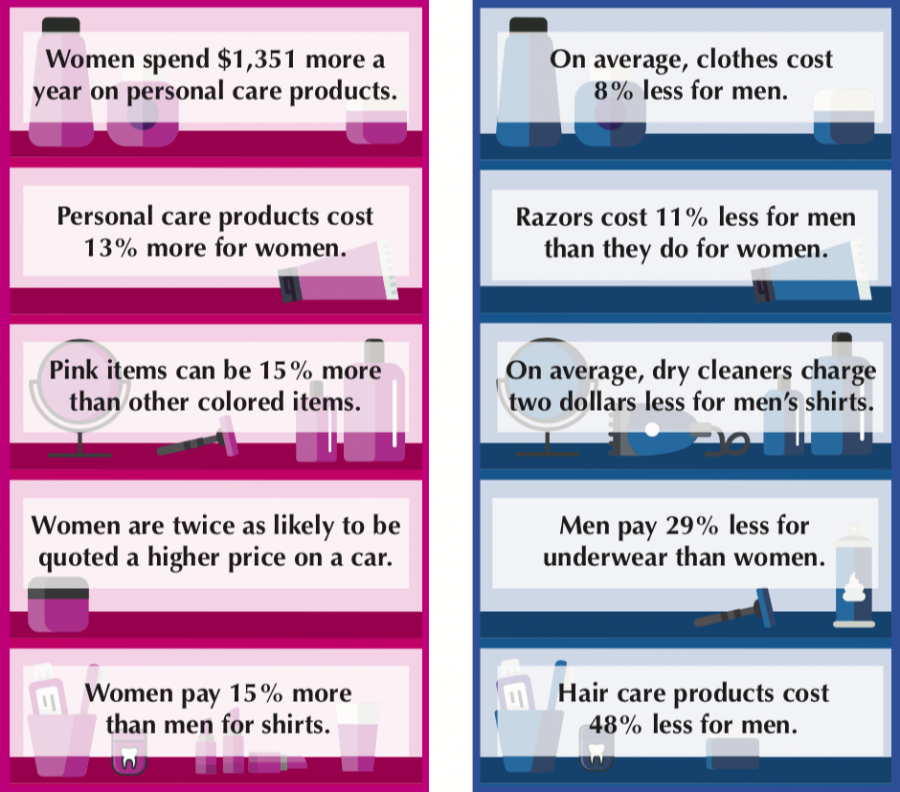The price of being female
Pricing on personal care products and services differs between genders.
Images: Flaticon Sources: Listen Money Matters
When shopping for personal care items, many women reach for the pink shampoo bottle and the razor cartridge adorned with flowers and labeled “for women”, but few know that these products can cost up to 13 percent more than their blue, “for-men” counterparts.
“It’s really frustrating not only because women’s beauty and health products are more expensive, but things men don’t have to buy cost a lot, too,” sophomore Caitie Rois Macken said. “Things that are only necessary to women — like tampons and bras — add up.”
In addition to gender-based taxes on products, prices of many female expenses and necessities, such as haircuts, drycleaning, toiletries and clothing, are often higher than those for men. Women pay roughly 7 percent more than men for comparable products, a markup often referred to as the “Pink Tax,” according to a study by the New York City Department of Consumer Affairs.
“The pink tax is a phenomenon where the cost of goods and services for items marketed to women are often more expensive than equivalent goods and services marketed to males,” Michael Cone, founder of the website Pink.Tax, said.
Cone first noticed a disparity when studying import taxes, formally called customs duties, which appeared to be gender-based. Duties on some women’s shoes were 10 percent, while duties for similar shoes made for men were 8.5 percent, according Pink.Tax.
“It’s wrong. It’s an opportunity for mischief,” Cone said. “It’s a hangover from the 1830s or 1840s when this began, long before there was the equal protection clause, long before women had the right to vote, and long before gender was recognized under the equal protection clause.”
The average price for women’s shampoo is $8.39 while the average price for men’s shampoo is $5.68, a 48 percent decrease, according to Business Insider.
Gender-based pricing on services such as dry cleaning and hair cuts is illegal in a some states, including California which charges a fine of $1000 if a company is bias in their pricing and does not fix the problem in 30 days, according to Cone.
The California State Legislature attempted to further eliminate discriminatory taxes when it passed an act prohibiting taxes on diapers and feminine hygiene products in 2016, but Gov. Jerry Brown vetoed the measure.
“Whenever you eliminate revenue from state tax, the legislators in the government want to know how you’re going to replace the revenue,” Cone said. “The law went up to Jerry Brown — it was going to replace the loss of revenue on diapers and feminine hygiene products with an increase in the tax on liquor — and Gov. Brown vetoed it.”
The issue was addressed on the national level as well, when Congresswoman Jackie Speier (CA-14) introduced H.R. 5464, the Pink Tax Repeal Act, to Congress in April.
“Women get hit with a double whammy: They make less for doing the same work and they pay more for the same product or service because it’s for women,” Speier said in a press release on her website. “Whether it’s a pink teddy bear, deodorant from the same manufacturer, or a white laundered shirt, it’s time to say enough! Discrimination is illegal.”
Some students such as junior Maggie Walter question the reasoning behind why women pay more for equivalent products.
“It’s upsetting and makes no sense because women often make less than men,” Walter said. “Why do we have to pay more for these products that don’t even work more efficiently? Men’s deodorant lasts longer, their razors are sharper, but we still pay more for our pink items.”
Other students such as sophomore Catie Rois Macken credit the disparity to the patriarchal aspect of society.
“There really isn’t a real reason or justification for women’s products being so much more,” Macken said, “but I think it comes down to it being a male-dominated world.”
Cone suggests voting with “your purse” — not purchasing products with gender-based taxes — and “your pen” — writing a letter or email to a member of the government. Many protest the raised prices by using hashtags such as #genderpricing, #pinktax and #gendertax.
“If consumers don’t buy something — or they buy less of it — the manufacturers will make less or they’ll stop making,” Cone said. “Women have to stand up and fight.”








